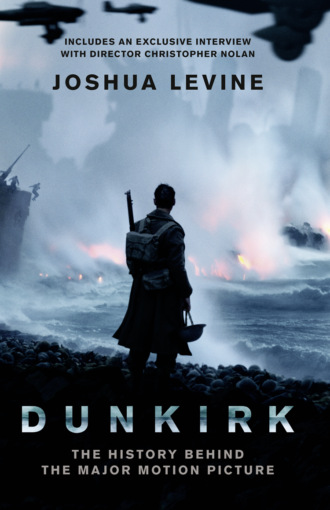
Полная версия
Dunkirk: The History Behind the Major Motion Picture
To me that feels like the essence. Do you agree with that?
CN: Yes. I think the film is very much based on that same assessment of the illusive nature of individual subjective experience defining objective reality. Which is a connecting thread with all the films I’ve ever made. They are all about individual experiences, potential contradictions with objective reality, and the film tries very strongly to leave space for the seemingly infinite number of experiences and stories that would contradict each other or comment on each other in different ways. We tell three stories that intersect at a point. We show the point when they come together and they are very, very different experiences. Watching a Spitfire pilot ditch from the other Spitfire, it looks calm and controlled, but to actually go through that as you do later in the film is completely different. A massive contrast. That is something that’s always fascinated me about human experience.
JL: We went on a trip round parts of Britain meeting Dunkirk veterans. What did you learn from that?
CN: Absolutely vital things. But what was interesting was that although when we were talking to those people I was honoured and humbled, I wasn’t necessarily inspired or aware in the moment exactly what I was going to get out of these conversations. I knew it was a smart thing to do. We needed to talk to people who had actually been there if we were going to presume to portray their experience. It’s really only when I look back at the film now … when I look at the scene where they watch the guy walk into the water, I don’t know what that guy’s doing, whether he’s killing himself or whether he thinks he can actually swim out. But the reason I don’t know is because I think I even asked him [the veteran] ‘Was he killing himself?’ and he didn’t have an answer. This was a direct thing he had seen.
JL: Did the man himself even know what he was doing?
CN: I don’t know. Exactly.
JL: We like to pin a certainty on everything – ‘This is what he’s doing’ – and actually we don’t even know why we do what we do half the time. And in a situation like that, where the pressures are unimaginable …
CN: A lot of what I got from the conversations with those amazing people was confidence that things that we were intending to do were supported by people’s experience. Different people talking about being on the mole, people getting off the boat, the chap bringing water to Dunkirk, which meant getting off the boat and then not being able to get back on the same boat. It’s just this nightmarish feeling of chaos. Ordered chaos, I suppose you’d call it, or the almost bureaucratic chaos that was apparent on the mole. It’s very interesting listening to people talk about that. And also with that chap who, although he wasn’t a civilian, he’d come over from England to supply water – one of the things that fascinates me is the mechanics. This is why Tommy is trying to go to the loo at the beginning, because those things are interesting; the logistical things. Where are you going to get food from? Water? It’s something that was never planned and is being done ad hoc and so hearing the accounts of somebody who came over with water and saw all the fires from a distance and knew he was going there. That’s an omnipresent image in the film: heading towards these burning fires. It’s on the horizon. It’s the last place you want to go. There were all kinds of things I got from those conversations. They seeped in over time. I think it was very informative asking as you did what their interpretation of the Dunkirk spirit was, because there were such different interpretations. Three very distinct interpretations, as I remember. One was the little ships representing the idea of the Dunkirk spirit. Another was, I can’t remember the words he used, but he basically said it was complete bullshit. And then the last chap we were talking to, he related it to the people holding the perimeter who were left behind. And they were all three absolutely definitive in their own interpretation: that’s what it is, that’s what it means.
JL: Absolutely. I remember one said, ‘You were only worried about yourself.’
CN: Yes. I think he was one of the most interesting people to talk to. What he implied to us was that he’d gone through a set of experiences of which he was not proud, but which he firmly felt were in the norm of that situation for the people that were there. I felt that he wasn’t in any way saying he had done anything wrong or different, but that there were things which shouldn’t be talked about, which were best left there. And for me the whole relationship between Alex and Tommy and Gibson was that moment. It’s not meant to be judgemental of people. I felt that there was a window which opened up on to the privacy of that subjective experience.
JL: I find it interesting that when you get to a certain age the order of things often disappears. Stories no longer move from beginning to end. Time becomes increasingly irrelevant. For me, as a barrister and now a writer, I instinctively want to reorder people’s stories, make logical sense of them. But you’re coming from a totally different perspective, which I find very interesting. You’ve dealt so much in your films with the nature of time that – to you – there was something very honest about this.
CN: Very much. My job is to tell a story in a very disciplined and ordered manner, whether it’s chronological or not, and I wouldn’t have a job if it were natural to people conversationally. The reality is that people’s nature is not to be able to relate their experiences in an absolutely coherent manner, for whatever reason. So storytelling, in whatever form, always has value in society because it’s a particular skill. It’s putting something into a different form, and that’s why the guy not telling us about that specific experience creates an interesting hole in our knowledge which I think is much more expressive than the words would be. Whatever happened, I think he was aware on some level that it would either sound trivial to us, because perhaps he had just sworn at an officer, for example, or it would seem truly shameful, and we wouldn’t be able to understand. Whatever it is, his subjective experience, by becoming a story, would be greatly reduced. I find it very powerful and thought-provoking to think of it as a little gap in our knowledge. It confirms everything that the research suggested, which is that there was an enormous range of experience.
Конец ознакомительного фрагмента.
Текст предоставлен ООО «ЛитРес».
Прочитайте эту книгу целиком, купив полную легальную версию на ЛитРес.
Безопасно оплатить книгу можно банковской картой Visa, MasterCard, Maestro, со счета мобильного телефона, с платежного терминала, в салоне МТС или Связной, через PayPal, WebMoney, Яндекс.Деньги, QIWI Кошелек, бонусными картами или другим удобным Вам способом.





